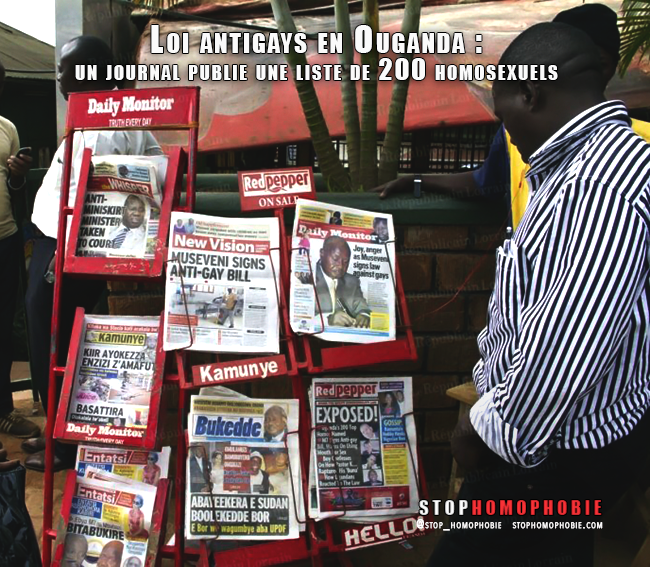>> Uganda’s List Of ‘Top 200’ Gays: Paper Slated
Un journal ougandais a publié mardi les noms de 200 personnalités qu’il prétend homosexuelles, au lendemain de la promulgation d’une loi qui durcit la déjà sévère répression de l’homosexualité en Ouganda, laissant craindre une recrudescence des actes homophobes largement répandus.
«Mis à nu!», titre en une mardi le tabloïd Red Pepper, habitué des ragots sordides, de préférence sexuels. «Les deux 200 principaux homos d’Ouganda identifiés», proclame-t-il en sous-titre, à côté des photos d’un responsable d’une association de défense des minorité sexuelles, d’un populaire prêtre catholique, d’une rappeuse renommée et d’une militante connue de la cause homosexuelle.
Parmi les noms publiés – tous relativement connus en Ouganda – figurent quelques homosexuels affirmés, mais la grande majorité des personnes nommées – dont des défenseurs de la cause homosexuelle – n’ont jamais exprimé publiquement leur préférence sexuelle.
«La chasse aux sorcières médiatique est de retour», a twitté Jacqueline Kasha, célèbre militante de la cause homosexuelle en Ouganda, dont le nom avait été publié en octobre 2010 dans un autre tabloïd local – Rolling Stone – au côté de ceux de 100 prétendus homosexuel(le)s, sous le titre «Pendez-les!».
Jacqueline Kasha avait fait condamner le journal au côté notamment de David Kato, figure de la cause homosexuelle en Ouganda, lui aussi cité et assassiné quelques mois plus tard.
Fin 2013, Red Pepper avait publié des photos montrant un retraité britannique, Bernard Randall, ayant des relations homosexuelles, images privées tirées de son ordinateur volé, entraînant l’inculpation de l’intéressé pour «trafic d’images obscènes». Finalement acquitté mi-janvier, M. Randall a été expulsé d’Ouganda, accusé de corrompre les moeurs de la jeunesse.
Les observateurs craignent qu’elle n’encourage harcèlement et violences déjà répandus dans le pays où l’homophobie est alimentée par les puissantes Eglises évangéliques.
Lundi, la police a dû rappeler à la population qu’elle n’avait pas à faire justice ou à appliquer la loi elle-même, après l’arrestation à Kampala de six hommes qui forcaient à se déshabiller des femmes court vêtues, en vertu d’une loi antipornographie promulguée en février qui interdit notamment les vêtements «provocants».
Même si ses dispositions les plus controversées – qui prévoyaient la peine de mort dans certains cas – ont été abandonnées, cette loi a suscité de sévères critiques des défenseurs des droits de l’Homme et des homosexuels, ainsi que de nombreux partenaires occidentaux de l’Ouganda.
>> A Ugandan newspaper has named who it says are the country’s 200 « top homosexuals » a day after widely criticised anti-gay laws were introduced.
The list, in the Red Pepper tabloid which carried the headline « Exposed! », featured some who have openly declared their sexuality as well as those who had not.
Prominent gay activists, including one who warned the legislation could spark violence against homosexuals, were named alongside a popular Ugandan hip-hop star and a Catholic priest.
The paper said: « In salutation to the new law, today we unleash Uganda’s top homos and their sympathisers. »
In 2011, prominent Ugandan gay rights campaigner David Kato was bludgeoned to death at his home after a different newspaper carried photos, names and addresses of people it said were gay in Uganda along with the headline « Hang Them ».
« The media witch hunt is back, » Jacqueline Kasha, a well-known Ugandan lesbian activist, tweeted.
Ben Byarabaha, Red Pepper’s news editor, said they published the full names of only the well-known activists and had tried to use nicknames for those not publicly gay.
Others, such as a retired Anglican cleric who supports gay rights, are listed as sympathisers.
Mr Byarabaha has not given any details about how the full list was compiled.
Those taking part in gay sex face life in prison, under the ‘crime’ of « aggravated homosexuality » which also includes sex with a minor or while HIV positive.
The bill had originally proposed the death penalty.
The legislation also creates offences of « conspiracy to commit homosexuality » as well as « aiding and abetting homosexuality, » both of which are punishable with a seven-year jail term.
Those convicted of « promoting homosexuality » face similar punishment.
The laws – which came just over a month after Nigeria passed a similar measure against gays – have been condemned around the world, although it is widely popular among Ugandans.
President Yoweri Museveni, who signed the bill into law, said it was needed because the West was promoting homosexuality in Africa.
And he rejected international criticism, saying other countries should not interfere in Uganda’s internal affairs.
Mr Museveni also accused « arrogant and careless Western groups » of trying to recruit Ugandan children into homosexuality, but he did not name these purported groups.
Police spokesman Patrick Onyango said no homosexuals have been arrested since the president signed the bill but at least two had been taken into custody since politicians passed the bill last December.
US Secretary of State John Kerry said Monday’s signing marked « a tragic day for Uganda and for all who care about the cause of human rights ». He also warned Washington could cut aid to the East African government.


















